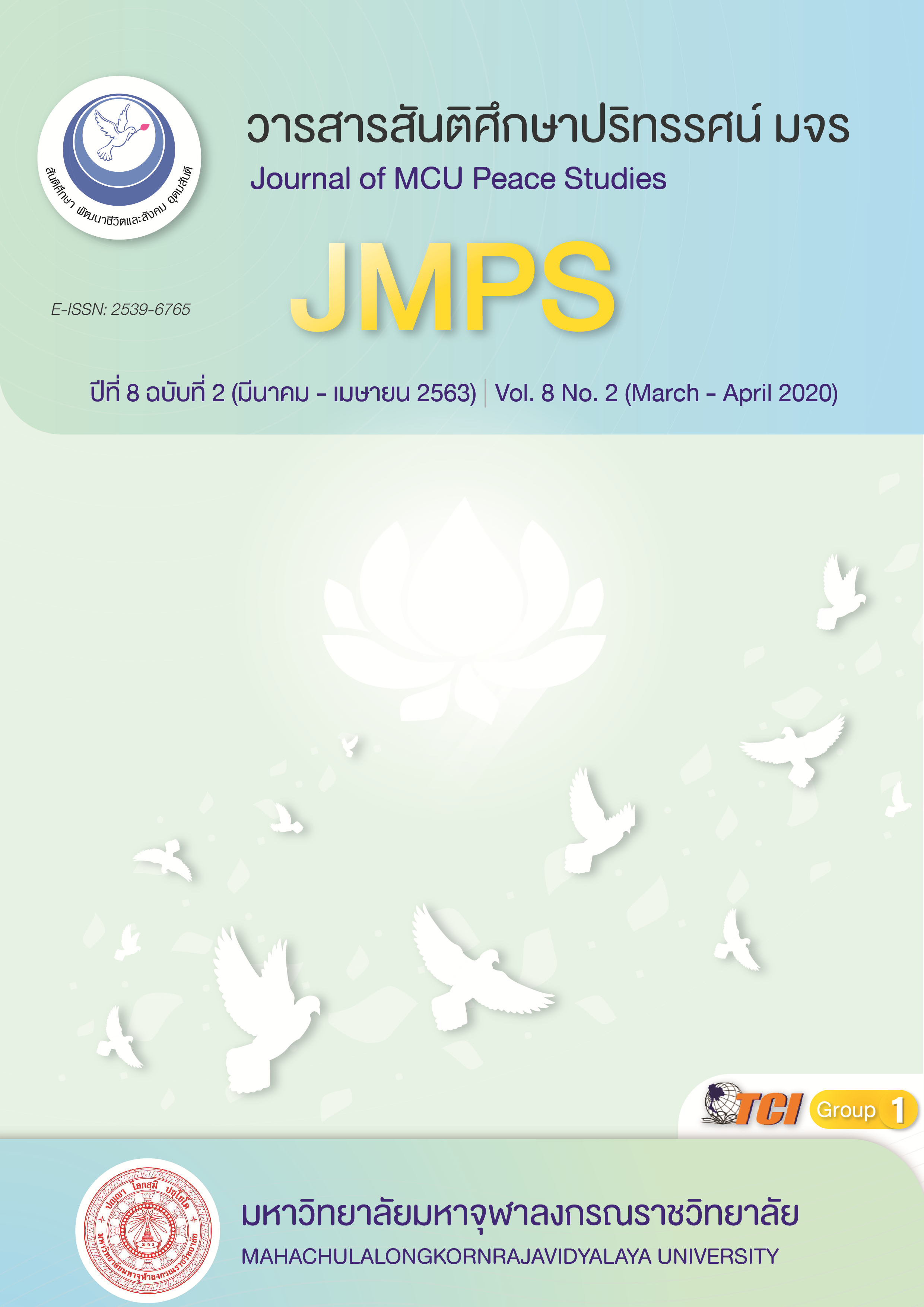ผลของการเจริญสติและกระบวนการแก้ปัญหาที่มีต่อความเครียดและผลสัมฤทธิ์ ทางการเรียนของนักเรียนชั้นมัธยมศึกษาตอนปลาย ในเขตอำเภอเมือง จังหวัดกาญจนบุรี
Main Article Content
บทคัดย่อ
การวิจัยครั้งนี้มีวัตถุประสงค์1 ) เพื่อศึกษาผลของการเจริญสติและกระบวนการแก้ปัญหาที่มีต่อความเครียดและผลสัมฤทธิ์ทางการเรียนของนักเรียนชั้นมัธยมศึกษาตอนปลายในเขตอำเภอเมืองกาญจนบุรี
2) เพื่อเปรียบเทียบผลของการเจริญสติและกระบวนการแก้ปัญหาที่มีต่อความเครียดและผลสัมฤทธิ์ทางการเรียน ของนักเรียนชั้นมัธยมศึกษาตอนปลาย ในเขตอำเภอเมืองกาญจนบุรี รูปแบบการวิจัยเป็นแบบกึ่งทดลอง กลุ่มตัวอย่างเป็นนักเรียนชั้นมัธยมศึกษาตอนปลาย กำหนดตัวอย่างโดยใช้โปรแกรม G*Power ใช้การ Matching ในเรื่องคะแนนการทดสอบวิชาคณิตศาสตร์ แบ่งเป็น 3 กลุ่ม คือกลุ่มที่ฝึกเจริญสติ กลุ่มที่ฝึกเจริญสติและกระบวนการแก้ปัญหา กลุ่มควบคุม ทำการวัดผลทั้งก่อนทดลองและหลังทดลอง ใช้ข้อสอบวิชาคณิตศาสตร์ และแบบประเมินความเครียด DASS พิสูจน์สมมติฐานด้วย f- test
ผลการวิจัยพบว่า กลุ่มที่ฝึกเจริญสติและกระบวนการแก้ปัญหามีความเครียดลดลงและมี ผลสัมฤทธิ์ทางการเรียนเพิ่มขึ้นหลังจากการฝึกอย่างมีนัยสำคัญทางสถิติที่ระดับ .05 กลุ่มที่ฝึกการเจริญสติจะมีความเครียดลดลงและผลสัมฤทธิ์ทางการเรียนเพิ่มขึ้นหลังจากการฝึกอย่างมีนัยสำคัญทางสถิติที่ระดับ .01 ผลสัมฤทธิ์ทางการเรียนระหว่างกลุ่มที่ฝึกเจริญสติและกระบวนการแก้ปัญหา กลุ่มที่ฝึกเจริญสติและกลุ่มควบคุม แตกต่างกันอย่างมีนัยสำคัญทางสถิติที่ระดับ .05 กลุ่มที่ฝึกเจริญสติกับกระบวนการแก้ปัญหา มี
ผลสัมฤทธิ์ทางการเรียนเพิ่มขึ้นมากกว่ากลุ่มที่ฝึกเจริญสติและกลุ่มควบคุม อย่างมีนัยสำคัญทางสถิติที่ระดับ .05
Article Details
ทัศนะและความคิดเห็นที่ปรากฏในบทความในวารสาร ถือเป็นความรับผิดชอบของผู้เขียนบทความนั้น และไม่ถือเป็นทัศนะและความรับผิดชอบของกองบรรณาธิการ ยินยอมว่าบทความเป็นลิขสิทธิ์ของวารสาร
เอกสารอ้างอิง
Atkinson, R. C., & Shiffrin, R. M. (1968). Human memory: A proposed system and its control processes. The Psychology of Learning and Motivation, 2, 89-195.
Goldstein J., & Kornfield, J. (1987). Seeking the heart of wisdom: The path of insight meditation. Boston. MA: Shambhala Publications. Inc.
Kabat-Zinn, J. (1999). Indra’s Net at Work: The Mainstreaming of Dharma Practice in Society. In: Watson G, Batchelor S, Claxton G, editors. The Psychology of an Awakening: Buddhism, Science, and Our day-to-Day Lives. London: Rider.
Kyaing, W. (2019). The Buddhist Cultural Remains of Sri Ksetra. Asia Pacific Journal of Religions and Cultures, 3(2), 49-64.
Phramaha Narit Wongmuangkaen. ( 2014) . The development of Learning Achievement, Behavior on self-Discipline and Opinion of Mathayomsuksa 1 Students using The Anapanasati Meditation Practice. Journal of Education Graduate Studies Research Khon Kaen University, 5(1), 73-79.
Sangkhaphat, P. (2010). Research and Development of the Four Noble Truth Step-Based Teaching Approach for Problem Solution Skill Development of Mattyom Suksa 3 Students of Benjamamaharad School, Ubon Ratchathani Province. (Master's Thesis ). Graduate School: Ubon Ratchathani Rajabhat University. Ubon Ratchathani.
Tan, C.C. (2019). Intercepting Stimulus-Organism-Response Model, Theory of Planned Behavior and Theory of Expectancy Confirmation in the Study of Smartphone Consumer Behavior: A Thai University Student Perspective. Asia Pacific Journal of Religions and Cultures, 3(2), 27-48.
Teyun, N. (2019). Emotional Intelligence of Elementary School Students of Chusin Thongpradit Anusorn School Thung Khru District Office, Bangkok. Journalof Arts Management, 3(1), 43-52.
Uraisakul, S. (2012). The Development of Ideas for Problem Solving By the Four Noble Truths Method (Research Report). Rajamangala Institute of Technology Hanta Campus. Phra Nakhon Si Ayutthaya.
Yu-iam, S., Srisawat, P., Suknaisith, A., & Koolnaphadol, P. (2017) . Adevelopment of Integrative Stress Management Group Counseling Program and Alternative Medicine Science. Journal of the Police Nurses, 9(2), 139-152.


